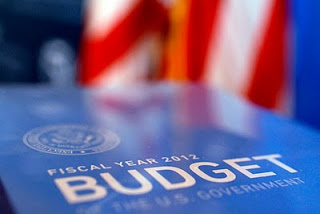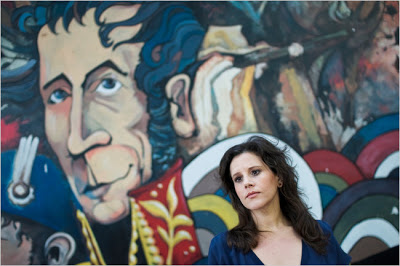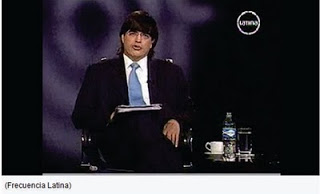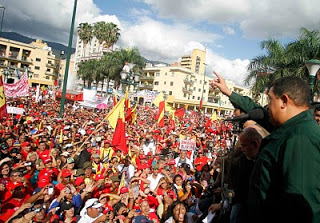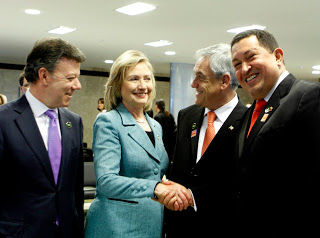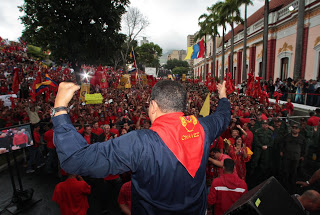
By Eva Golinger
This week, Venezuelans commemorated the 9-year anniversary of the failed coup d’etat that briefly ousted President Chavez from power and dissolved the nation’s democracy, installing a US-backed dictatorship. In an extraordinary turn of events, a popular uprising crushed the coup just hours later
This Wednesday, April 13, thousands of Venezuelans marched on the nation’s capital, celebrating what has come to be known as the “Day of Civil-Military Strength and Dignity”. It was nine years ago on this day that millions of Caracas residents, together with loyal armed forces and the Presidential Guard, defeated a US-backed coup d’etat that had forcefully taken power just 48 hours prior.
The coup, executed by business leaders, corrupt union officials, private media owners, power-hungry military officers, former ruling-party politicians and “civil society” organizations - all financially and politically supported by US government agencies, the State Department and the White House (see “The Chavez Code: Cracking US Intervention in Venezuela” by Eva Golinger, Olive Branch Press 2006) - succeeded briefly in ousting President Chavez and his government from power on April 11, 2002.
Utilizing images manipulated by private television station, Venevision, the coup forces justified their actions by blaming the violence and deaths that occured that day on the Venezuelan head of state. In reality, as top secret Central Intelligence Agency (CIA) documents have revealed, the coup was planned in the days and weeks prior to its execution. The objective was to use an anti-Chavez protest to provoke violence and unrest in the capital, Caracas, putting into action a detailed plot using snipers to fire on the crowds, causing deaths and injuries, which would be blamed on the government, justifying its ouster. As one top secret, now partially-declassifed CIA document from April 6, 2002 (5 days before the coup took place) outlines, after the violence was provoked by coup forces, “President Chavez and other top members in his cabinet...would be arrested” and a “transitional government” would be installed.
Chavez was detained by force on the evening of April 11, 2002, and kidnapped by dissident military officers, on the orders of the coup leaders. Meanwhile, the US ambassador in Caracas, Charles Shapiro, was coordinating the actions on the ground with media owners, metropolitan police forces involved in the sniper shootings, and of course the business and political leaders that forcefully took over the government. Documentary evidence proves that Shapiro held several meetings and conversations during the events of April 11, 2002, with the metropolitan police commissioner, Henry Vivas, as well as with Gustavo Cisneros, owner of Venevision, and Pedro Carmona, who subsequently took over the presidency and declared himself head of state.
PEOPLE’S POWER
As the coup unfolded and Carmona, then head of Venezuela’s chamber of commerce, Fedecamaras, unilaterally and illegally swore himself into office as president, the constitutional president, Hugo Chavez, was held hostage and incomunicado on a small island military base off Venezuela’s coast. The only non-private national television station, state-owned VTV, was taken off the air by then governor of the state of Miranda, Enrique Mendoza, in an effort to silence pro-Chavez forces and conceal information and events from the people. Private media - all involved in the coup - broadcast cartoons, old movies and soap operas, while print media published articles justifying and supporting the “transition government”.
Before an audience of about 400 people in the presidential palace, Miraflores, Pedro Carmona issued a decree dissolving all of the nation’s democratic institutions: the Supreme Court, the National Assembly (Congress), the Attorney General, Public Defender, Comptroller, the Executive cabinet, and even the national Constitution. Police forces, under the control of the coup regime, repressed pro-Chavez protestors in the streets, killing and injuring over 100 people during those hours.
But despite the media blackout on the real events that were taking place, millions of Venezuelans, unwilling to accept the disappearance of their constitutionally-elected president and the imposition of a dictatorship that openly dissolved their democracy, took to the streets in protest. Armed forces loyal to President Chavez began taking over military barracks and urging people to come out in the streets to express their popular will. Within hours, the presidential palace was flooded with demonstrators, demanding the return of President Chavez and the ouster of the coup government.
Meanwhile, a low-ranking soldier guarding Chavez, urged the Venezuelan chief to write a note saying he was alive and still President of Venezuela, pledging he would find a way to get the letter into the public light. He succeeded. The famous letter, written in Chavez’s unmistakable handwriting, declaring the Venezuelan president had never “renounced the legitimate power given to him by the people”, made it into the hands of military forces loyal to their Commander in Chief. A rescue mission was immediately activated and Chavez was flown back in a helicopter to the presidential palace right around midnight on April 13.
The millions that surrounded the palace, together with the loyal presidential guard, were able to force out the coup leaders, who incredulously emptied the presidential safes and stole as much as they could before escaping. As Chavez descended from the helicopter, cries and cheers were heard from the crowd. An extraordinary feeling of community power, justice and love eminated from those who had risked their lives to rescue their democracy, their constitution, their president, and most of all, their dignity.
THREATS CONTINUE
During the celebration this Wednesday, President Chavez, speaking before a volumunious crowd that marched to the presidential palace grounds, reaffirmed that “Nobody can topple our Revolution again”, warning those who continue with destabilization plans that they will be “swept away” and “never return”.
As the crowds chanted “The people united will never be defeated”, the Venezuelan President, reflected on the events 9 years ago, “They came at us with a coup backed by powerful interests, the US government and the elite, but they were met but something even more powerful: the people of Venezuela and our real soldiers”.
Nonetheless, the majority of those involved in the coup remain present in Venezuelan politics today, still aiming to oust Chavez’s government and put an end to the Bolivarian Revolution. During the 9 years since the coup, US government funding for opposition groups and parties in Venezuela has increased exponentially, reaching nearly $15 million annually from State Department agencies alone.
Several of the key members of the coup, who were given amnesty by President Chavez in 2007 in an attempt to promote national dialogue, today hold positions in regional governments (governors and mayors), and in the nation’s National Assembly. From these legitimate platforms, they continue to conspire against the Chavez administration.
Ironically, during this week’s coup anniversary, one participant in the April 2002 events, Maria Corina Machado, now a member of the National Assembly, was invited by the Department of State to dictate several conferences in the US, including one in Miami titled “600 Days to Eradicate Authoritarianism: Transforming Venezuela”. While in Miami, Machado “celebrated” with a community of self-exiled Venezuelans, many of whom played key roles in the coup. Machado is slated to be an opposition contender in Venezuela’s presidential elections in 2012.
